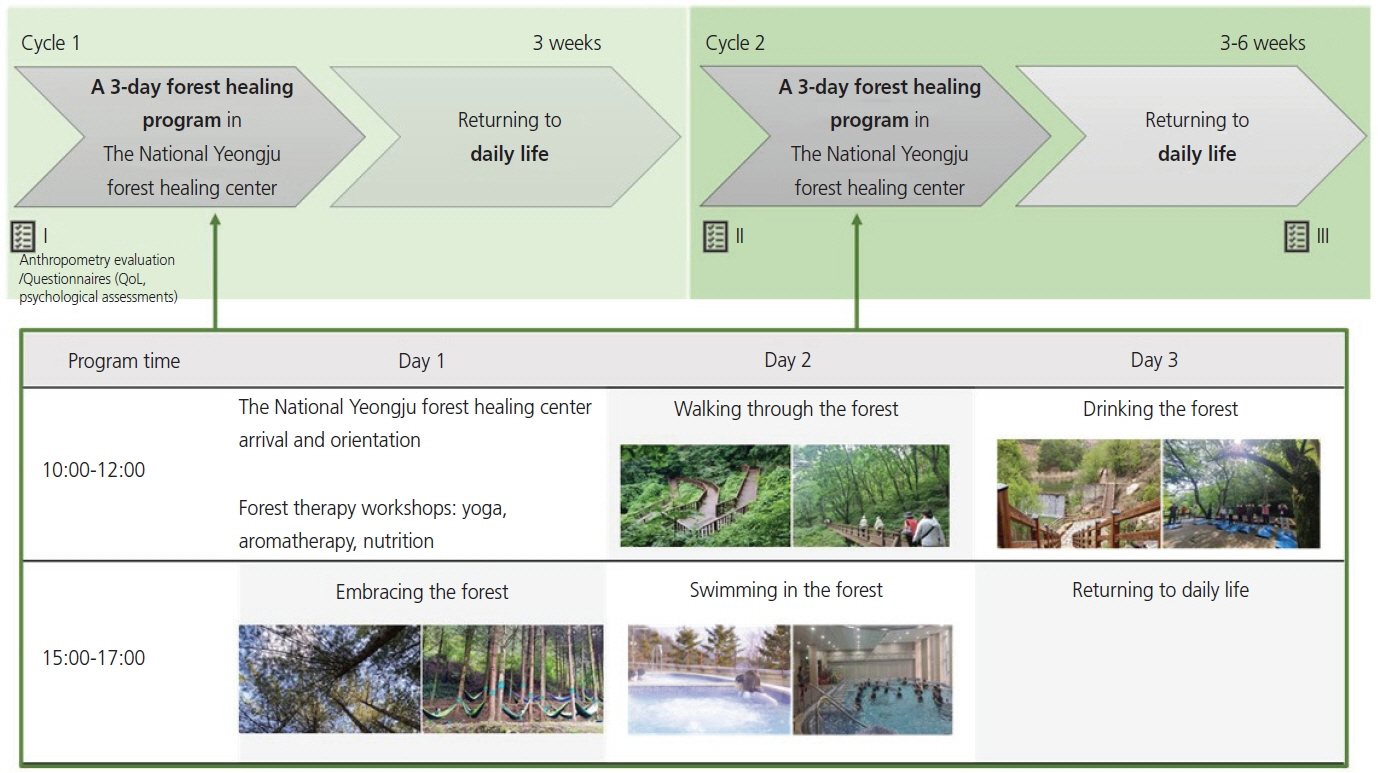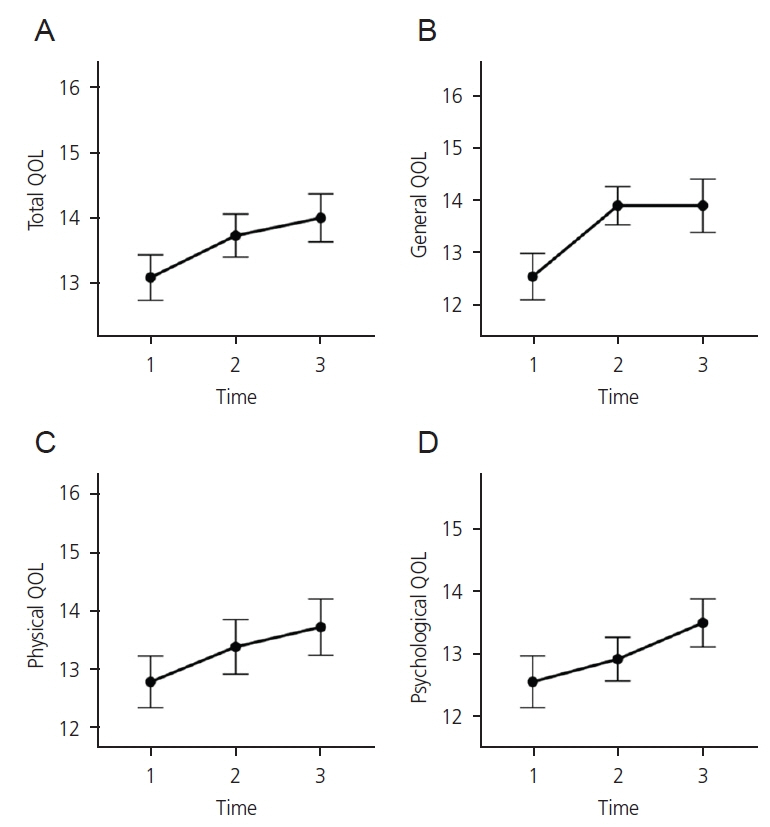Obstet Gynecol Sci.
2024 Jul;67(4):404-413. 10.5468/ogs.24035.
Living lab modelling as a pilot study assessing the potential psychological health benefits of forest environment for cancer survivors
- Affiliations
-
- 1Department of Obstetrics and Gynecology, Ewha Womans University Mokdong Hospital, Ewha Womans University College of Medicine, Seoul, Korea
- 2Department of Family Medicine, Ewha Womans University Seoul Hospital, Ewha Womans University College of Medicine, Seoul, Korea
- 3Department of Women’s Rehabilitation, National Rehabilitation Center, Seoul, Korea
- KMID: 2557857
- DOI: http://doi.org/10.5468/ogs.24035
Abstract
Objective
To evaluate the physiological and psychological changes in cancer survivors who engage in repeated forest therapy in a living environment.
Methods
This study included stay-based forest therapy for female cancer survivors aged ≥40 years. The program was conducted in two cycles, each spanning 3 weeks and consisting of a 2-night, 3-day stay, followed by daily life integration. The cycles were repeated from July 2, 2022, to August 18, 2022. Participant assessment included standard physical health parameters and a questionnaire on general characteristics, lifestyle habits, stress levels, and health status.
Results
Thirty-seven female cancer survivors participated in the forest healing program, 56.8% of whom had a history of breast cancer. The median body mass index (BMI) was 23.80 kg/m2 (range, 21.00-25.60). More than half of the patients reported mild-to-moderate fatigue, chronic pain, and mild-to-moderate depression (81%, 65%, and 73%, respectively). After two cycles of forest therapy, no significant differences were observed in terms of fatigue, pain, or BMI levels. However, significant improvements were found in quality of life measures, particularly the psychological quality of life (mean score 12.54 at baseline vs. 13.48 after cycle 2; P=0.007). Positive improvements were also observed in terms of stress (mean score 17.03 vs. 13.76; P=0.002) and depression (mean score 8.35 vs. 6.11; P=0.002) levels.
Conclusion
Our forest-healing program demonstrated that nature-based therapies improve the mental health and quality of life of female cancer survivors, suggesting the need for further research on nature-based interventions to better support cancer survivors.
Figure
Reference
-
References
1. Yun BS, Park EH, Ha J, Lee JY, Lee KH, Lee TS, et al. Incidence and survival of gynecologic cancer including cervical, uterine, ovarian, vaginal, vulvar cancer and gestational trophoblastic neoplasia in Korea, 1999-2019: Korea Central Cancer Registry. Obstet Gynecol Sci. 2023; 66:545–61.2. Kanjak J, Likitdee N, Kietpeerakool C, Temtanakitpaisan A. Evaluation of mobile health applications for cervical cancer in the digital marketplace. Obstet Gynecol Sci. 2022; 65:244–55.
Article3. GBD 2019 Cancer Risk Factors Collaborators. The global burden of cancer attributable to risk factors, 2010-19: a systematic analysis for the Global Burden of Disease Study 2019. Lancet. 2022; 400:563–91.4. Oh CM, Won YJ, Jung KW, Kong HJ, Cho H, Lee JK, et al. Cancer statistics in Korea: incidence, mortality, survival, and prevalence in 2013. Cancer Res Treat. 2016; 48:436–50.
Article5. Debela DT, Muzazu SG, Heraro KD, Ndalama MT, Mesele BW, Haile DC, et al. New approaches and procedures for cancer treatment: current perspectives. SAGE Open Med. 2021; 9:20503121211034366.
Article6. Miller KD, Nogueira L, Devasia T, Mariotto AB, Yabroff KR, Jemal A, et al. Cancer treatment and survivorship statistics, 2022. CA Cancer J Clin. 2022; 72:409–36.
Article7. Liu ZY, Wang C, Zhang YJ, Zhu HL. Combined lifestyle, mental health, and mortality in US cancer survivors: a national cohort study. J Transl Med. 2022; 20:376.8. Park S, Lee S, Kim Y, Lee Y, Kang MW, Han K, et al. Altered risk for cardiovascular events with changes in the metabolic syndrome status: a nationwide populationbased study of approximately 10 million persons. Ann Intern Med. 2019; 171:875–84.
Article9. Jung HS, Myung SK, Kim BS, Seo HG. Metabolic syndrome in adult cancer survivors: a meta-analysis. Diabetes Res Clin Pract. 2012; 95:275–82.
Article10. Kim M, Kim IH, Lim MK, Kim Y, Park B. Increased prevalence of metabolic syndrome in adult cancer survivors: Asian first report in community setting. Cancer Epidemiol. 2019; 58:130–6.
Article11. Buttros Dde A, Nahas EA, Vespoli Hde L, Uemura G, de Almeida Bda R, Nahas-Neto J. Risk of metabolic syndrome in postmenopausal breast cancer survivors. Menopause. 2013; 20:448–54.
Article12. Andrykowski MA, Lykins E, Floyd A. Psychological health in cancer survivors. Semin Oncol Nurs. 2008; 24:193–201.13. van Leeuwen M, Husson O, Alberti P, Arraras JI, Chinot OL, Costantini A, et al. Understanding the quality of life (QOL) issues in survivors of cancer: towards the development of an EORTC QOL cancer survivorship questionnaire. Health Qual Life Outcomes. 2018; 16:114.
Article14. Baydoun M, Moran C, McLennan A, Piedalue KL, Oberoi D, Carlson LE. Mindfulness-based interventions in cancer survivors: a systematic review of participants’ adherence to home practice. Patient Prefer Adherence. 2021; 15:1225–42.
Article15. Anundi H, Dolling A, Palsdottir AM. Forest therapy for women with gynaecological cancer-a feasibility study to find new alternatives in cancer rehabilitation. Forests. 2023; 14:333.
Article16. Oh B, Lee KJ, Zaslawski C, Yeung A, Rosenthal D, Larkey L, et al. Health and well-being benefits of spending time in forests: systematic review. Environ Health Prev Med. 2017; 22:71.
Article17. Shim SR, Chang J, Lee J, Byeon W, Lee J, Lee KJ. Perspectives on the psychological and physiological effects of forest therapy: a systematic review with a meta-analysis and meta-regression. Forests. 2022; 13:2029.18. Piva G, Caruso L, Gómez AC, Calzolari M, Visintin EP, Davoli P, et al. Effects of forest walking on physical and mental health in elderly populations: a systematic review. Rev Environ Health. 2022; 39:121–36.
Article19. Reed DL, Sacco WP. Measuring sleep efficiency: what should the denominator be? J Clin Sleep Med. 2016; 12:263–6.
Article20. Hong JP, Park SJ, Park S, Lim A, Jeon D. Reliability and validity study of the Korean self rating version of quick inventory of depressive symptomatology (K-QIDS-SR). Mood Emot. 2013; 11:44–50.21. Oh H, Park K, Yoon S, Kim Y, Lee SH, Choi YY, et al. Clinical utility of beck anxiety inventory in clinical and nonclinical Korean samples. Front Psychiatry. 2018; 9:666.
Article22. Kim S, Lee EH, Hwang ST, Hong SH, Lee K, Kim JH. Reliability and validity of the Korean version of the beck hopelessness scale. J Korean Neuropsychiatr Assoc. 2015; 54:84–90.23. Min SK, Kim KI, Lee CI, Jung YC, Suh SY, Kim DK. Development of the Korean versions of WHO quality of life scale and WHOQOL-BREF. Qual Life Res. 2002; 11:593–600.24. Timko Olson ER, Olson AA, Driscoll M, Vermeesch AL. Nature-based interventions and exposure among cancer survivors: a scoping review. Int J Environ Res Public Health. 2023; 20:2376.
Article25. Blaschke S. The role of nature in cancer patients’ lives: a systematic review and qualitative meta-synthesis. BMC Cancer. 2017; 17:370.
Article26. Niedzwiedz CL, Knifton L, Robb KA, Katikireddi SV, Smith DJ. Depression and anxiety among people living with and beyond cancer: a growing clinical and research priority. BMC Cancer. 2019; 19:943.
Article27. Salvador C, Mark P, Hoenemeyer T, McDonald V. Prospective feasibility study of a mindfulness-based program for breast cancer patients in the southeastern US. Complement Ther Clin Pract. 2022; 49:101639.28. Kim H, Kim J, Ju HJ, Jang BJ, Wang TK, Kim YI. Effect of forest therapy for menopausal women with insomnia. Int J Environ Res Public Health. 2020; 17:6548.
Article29. Park SH, Han KS, Kang CB. Effects of exercise programs on depressive symptoms, quality of life, and self-esteem in older people: a systematic review of randomized controlled trials. Appl Nurs Res. 2014; 27:219–26.
Article30. Lawton E, Brymer E, Clough P, Denovan A. The relationship between the physical activity environment, nature relatedness, anxiety, and the psychological well-being benefits of regular exercisers. Front Psychol. 2017; 8:1058.
Article31. Li Q, Pan X, Li X, Huang W. Association of physical activity intensity with all-cause mortality in cancer survivors: a national prospective cohort study. Cancers (Basel). 2022; 14:5760.
Article32. Friedenreich CM, Stone CR, Cheung WY, Hayes SC. Physical activity and mortality in cancer survivors: a systematic review and meta-analysis. JNCI Cancer Spectr. 2019; 4:pkz080.33. Tong CKW, Lau B, Davis MK. Exercise training for cancer survivors. Curr Treat Options Oncol. 2020; 21:53.
Article34. Tabrizi FM, Radfar M, Taei Z. Effects of supportive-expressive discussion groups on loneliness, hope and quality of life in breast cancer survivors: a randomized control trial. Psychooncology. 2016; 25:1057–63.
Article35. McDonough MH, Beselt LJ, Kronlund LJ, Albinati NK, Daun JT, Trudeau MS, et al. Social support and physical activity for cancer survivors: a qualitative review and meta-study. J Cancer Surviv. 2021; 15:713–28.
Article36. Wang JW, Zhang TR, Shen Q, Yang ZQ, Liu C, Chen SJ, et al. The experience of cancer survivors in community-based psycho-social support activities in Shanghai, China: a qualitative study. Qual Life Res. 2015; 24:2815–22.
Article37. Lee BJ, Yim MH. Comparison of anthropometric and body composition indices in the identification of metabolic risk factors. Sci Rep. 2021; 11:9931.38. Dunsky A, Zach S, Zeev A, Goldbourt U, Shimony T, Goldsmith R, et al. Level of physical activity and anthropometric characteristics in old age—results from a national health survey. Eur Rev Aging Phys Act. 2014; 11:149–57.
Article39. Hui D, Glitza I, Chisholm G, Yennu S, Bruera E. Attrition rates, reasons, and predictive factors in supportive care and palliative oncology clinical trials. Cancer. 2013; 119:1098–105.
Article40. Gebert P, Schindel D, Frick J, Schenk L, Grittner U. Characteristics and patient-reported outcomes associated with dropout in severely affected oncological patients: an exploratory study. BMC Med Res Methodol. 2021; 21:77.
Article
- Full Text Links
- Actions
-
Cited
- CITED
-
- Close
- Share
- Similar articles
-
- Effects of Forest Therapy on Psychological Improvement in Middle-aged Women in Korea
- Psychological Status and Associated Factors among Korean Cancer Survivors: a Cross-Sectional Analysis of the Fourth & Fifth Korea National Health and Nutrition Examination Surveys
- Effects of a forest therapy camp on cancer survivors’ stress, mood and natural killer cells in Korea
- Exploring the Lack of Correlation between Handgrip Strength and Cancer History
- Update on distress management for cancer patients



